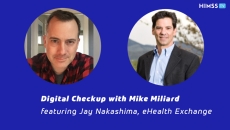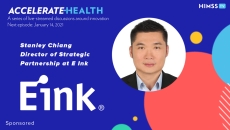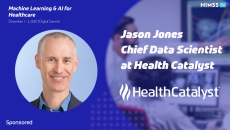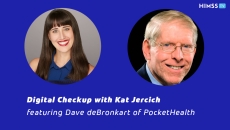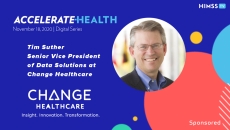HIMSS TV
From electronic case reporting to PDMP to disaster response, eHealth Exchange Executive Director Jay Nakashima says he's optimistic as network architecture improves and public-private data sharing efforts make progress.
This week's top stories include Optum and Change uniting; Amazon, Berkshire Hathaway and JPMorgan Chase's Haven joint venture calling it quits; and patient engagement tools playing a key role in streamlining the COVID-19 vaccine rollout.
SPONSORED
Stanley Chiang, E Ink's director of strategic partnership, discusses how the company's technology frees up nurses while ensuring patient data is accurate and improving the patient experience.
SPONSORED
Not only does Pure Storage bake security into its products, it partners with data protection vendors to ensure its products work with those healthcare organizations are already using, says Josh Gluck, VP of Global Healthcare Technology Strategy.
SPONSORED
When building predictive models that improve, not drive, health disparities, turn to augmented intelligence, not artificial intelligence, says Jason Jones, chief data scientist at Health Catalyst.
PocketHealth Chief Patient Officer Dave deBronkart, aka "e-Patient Dave," details how patients and providers can work as a team to ensure accuracy in health records and diagnosing.
Big data is going to be transformative, says Dr. Don Rucker, National Coordinator for Health Information Technology at the ONC, as ONC and CMS rules move healthcare from a gated interaction to digitally transparent clinical care.
SPONSORED
Pritesh Parekh, chief trust and security officer at Virtustream, says managing security tools across multiple platforms is challenging, so there's an urgency to unify security processes and controls across all environments.
Dr. Afzal Chaudhry, CMIO at Cambridge University Hospitals NHS Foundation Trust, says you start to see real benefits when you have that embodiment of technology fully embedded in the workflow.
SPONSORED
Change Healthcare SVP of Data Solutions Tim Suther discusses how social determinants of health analytics services provide data that EHRs don't capture, not only benefiting patients, but also payers, researchers and providers.
